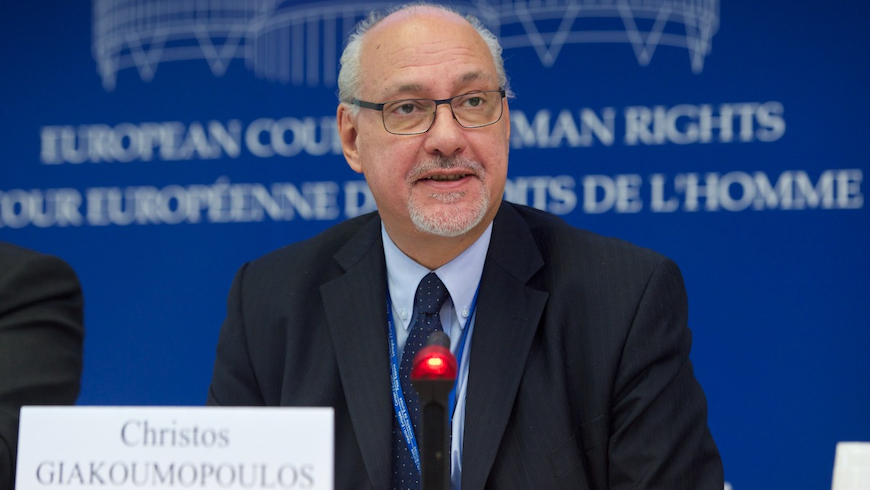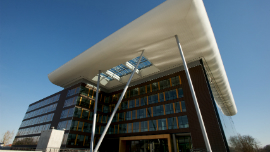Welcoming address by Christos Giakoumopoulos
2017 HELP Network Conference: "HELP for Friendly Justice"
19 June 2017, Strasbourg
Dear Ambassador,
Dear Judge of the European Court of Human Rights,
Dear participants to the 2017 HELP Network Conference,
Welcome to this year’s Conference. It is clear that throughout the years, the HELP Network is becoming stronger. It is good to recognise a number of familiar faces in the room.
This year’s title, “HELP for friendly justice” shows the importance that HELP places in making justice accessible for all. Indeed, HELP practical courses on crucial human rights topics can assist you in applying European standards in concrete cases that you deal with in your daily legal work.
Let me first underline the strong link that exists between the general priorities of the Council of Europe and the HELP Programme.
I will give you some examples:
Thorbjørn Jagland, the Secretary General, in his last annual report on the “State of democracy, human rights and the rule of law”, stressed that the checks and balances of European countries are not strong enough to prevent populist, anti-democratic and nationalistic forces gaining power, and calls on states to rebuild trust in democratic institutions and uphold their obligations under the European Convention on Human Rights (ECHR). He devotes special attention to the challenges posed by xenophobic attitudes, migration, social inequalities and terrorism.
As to how efficient, impartial and independent Europe’s judiciaries are, the Secretary General underlines that there are positive developments. Still, in spite of the existing adequate legislation in most countries, the real challenge lies on implementation, leaving judiciaries open to political interference. Although 38 countries have now achieved a clearance rate of over 95% for criminal cases, excessive length of proceedings still accounts for over 10% of violations established by the European Court of Human Rights in 2016. Legal certainty continues to be an issue, due to retroactive application of legislation or inconsistent –let’s say imprecise- practice of domestic courts.
In all these fields, HELP has been active, or will be.
Let’s take the rise of populism, which in several cases also fuels xenophobic attitudes and opinions. Approximately one year ago, I participated in the seminar organised in collaboration with the Spanish School for the Judiciary in Barcelona where we discussed the phenomena of racism, xenophobia and homophobia in Europe, and the most effective legal ways to combat them. The Seminar was organised under the EU-funded “HELP in the 28” and included a presentation of the HELP course against xenophobia and homophobia, developed in collaboration with our colleagues from ECRI and the ‘Sexual Orientation and Gender Identity’ Unit. Since then, the course has been launched in Austria, France, and Croatia, a 2nd edition is foreseen in Spain in the autumn. We plan to launch it also in Greece and possibly in Cyprus. One thing very appreciated by those who enroll in it is the fact that the course combines the European legal system of the Council of Europe and the EU as well as the case law of the European Court of Human Rights and the Court of Justice of the EU, alongside practical examples. This is a commonality with the rest of the courses developed under the project “HELP in the 28”.
If we talk about migration and refugees, the HELP/UNHCR course on asylum and the ECHR has been launched – and replicated when possible - in Belgium, Bulgaria, France, Greece, Italy, Serbia, Spain, the Russian Federation and Turkey. This continues to be one of our most demanded courses. HELP is currently working this year together with the CoE Children Division and the team of the Special Representative on Refugees to develop specific modules on different aspects concerning migrant and refugee children, namely proceedings upon arrival, family reunification, unaccompanied minors and alternatives to detention centers for child refugees and asylum seekers. A HELP course on internally displaced persons, relevant for CoE countries such as Ukraine and the states of former Yugoslavia, is also under development.
Promoting inclusive societies means reducing social inequalities and for this we are reinforcing our work to effectively protect rights enshrined in the European Social Charter (ESC), the social Constitution of Europe. In this regard, the Council of Europe fully supports the proposal for a "European Pillar of Social Rights" recently adopted by the European Commission. The Pillar draws on the Charter and is structured around three categories: equal opportunities and access to the labour market, fair working conditions and social protection and inclusion. Together, we, European institutions, need to work to overcome the crisis of the last decade, balancing aspirations of economic growth with social cohesion. So far, HELP’s major contribution to protect social rights has been the development of its course on labour rights and its launch in Greece, Lithuania, Portugal and Slovenia, where it also organised a high-level seminar in collaboration with the Supreme Court. We stressed the need for further ratification of the Revised ESC and the potential of the collective complaints procedure in protecting labour rights. This is one of our priorities, clearly expressed by the Secretary General when addressing the European Commission in respect of the European Pillar on Social Rights, but also a clear recommendation of the EU Parliament. We will hear more from Judge Petros Alikakos later.
Recently developed courses of particular relevance for judges are the HELP course on reasoning of judgments in criminal cases or the one on excessive length of proceedings initially developed for Russian legal professionals.
On the fight against radicalisation leading to terrorism and violence, I am happy to inform you that recently the EU approved the CoE’s proposal on Radicalisation Prevention that will allow us to develop a specific HELP course for judges, prosecutors, prison and probation staff and a number of seminars, mainly interesting for those countries more affected by this phenomenon. The objective is to improve the criminal justice response in the EU to prevent radicalisation leading to terrorism and violent extremism. In parallel, we are pleased to announce that the follow-up of the Project “HELP in the 28” is ensured with an emphasis now on launching cross-border courses.
And I could go on naming Council of Europe’s priorities and links with HELP… I am certain that you will hear more from other speakers and the HELP Secretariat, but I would just like to highlight the value of close collaboration of HELP with relevant CoE’s entities resulting in high quality education materials. Apart from those already mentioned, let me also add that we work closely and jointly with colleagues from the Strasbourg Court and those working on data protection, bioethics, medicrime, human trafficking, cooperation in criminal matters, media and internet, violence against women or children’s rights, and this list is by no means exhaustive.
Ladies and gentlemen,
As you see, HELP is not only a very dynamic Programme of the Council of Europe but one flexible enough to contribute to the response to the challenges that Europe is confronted with and which fill in the news every single day. We need to be clear: No actor, national or international, can face them alone. That is why we network more and more and need to cooperate closer with all the institutions you represent, be they national training institutions for judges and prosecutors, Bar associations, or international ones such as the FRA, the EU, EJTN[1] or CCBE[2]. We count on each of you at your different level of responsibility to ensure an improved implementation of European standards in your own countries. Thus, we call on you to renew your efforts to launch and integrate HELP courses in the programmes of your national training institutions. The good experiences of countries who replicate HELP courses by their own means should be emulated. This is already the case, among others, of France, Moldova, Romania, the Russian Federation, Spain, or Turkey.
The convergence between actions at national and European level is reflected in the HELP methodology, whereby model courses can later be adapted to the actual needs of countries and categories of legal professionals.
To conclude this introduction to your work, ladies and gentlemen, Europe only exists thanks to its members and its people. We can only talk about European standards because they are rooted in our shared European values, principles and constitutional ‘acquis’. But today’s turbulent world shows that democracy, rule of law and human rights have to be fought for daily if we do not want Europe to track back. We should refocus our work putting people and its rights at the center of our actions. Human rights and justice should serve the people and shall be seen as serving the people. This is what HELP aspires in line with this year’s conference title “HELP for friendly justice”.
Thank you very much for your attention.
[1] The European Judicial Training Network.
[2] The Council of Bars and Law Societies of Europe.




